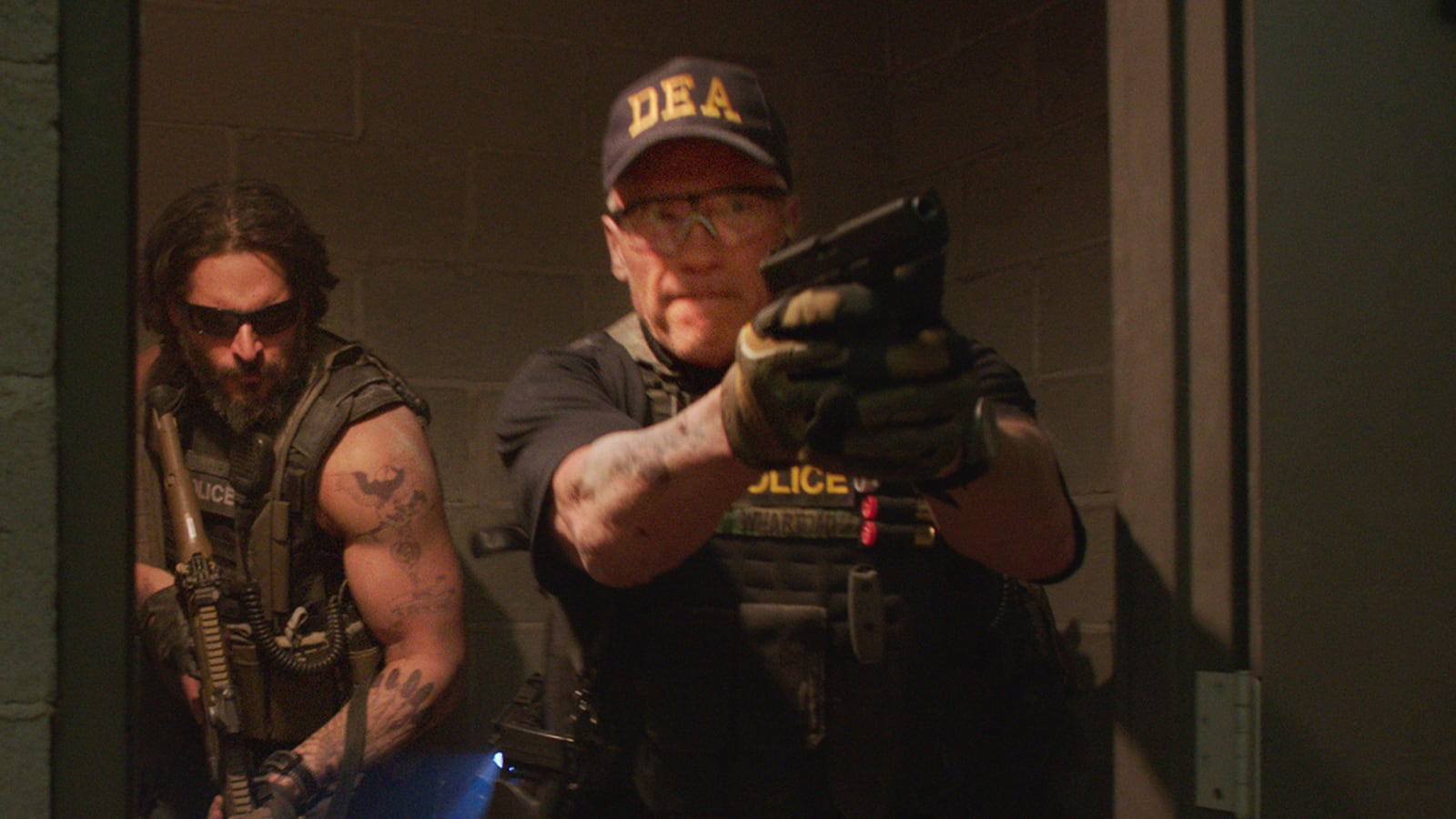He always said he'd be back.

Ahh-nold. Arnie. The Austrian Oak. The Governator. On Friday, former California Gov. Arnold Schwarzenegger returned to the big screen in Sabotage, only his third starring role since leaving office in 2011. For Schwarzenegger fans like me, the movie had all the makings of a breakthrough. Direction by David Ayers, the Navy submariner who wrote Training Day and helmed 2012's excellent End of Watch. No gimmicks, no supervillains, no tongue-in-cheek nostalgia—just a streetwise story about the deadly suspicions that infect an elite team of undercover DEA agents after the money they stole during a drug bust disappears. And a role for Schwarzenegger as John "Breacher" Wharton—a damaged legend of the drug wars—that seemed to suit his older, craggier persona. Finally, we said. The perfect career reboot.
Then we actually saw the movie. And it was awful. As I left the theater Friday afternoon—my ears ringing from the incessant cursing; my head spinning from all the entrails on display; my brain hurting from the daft plot twist in the third act—I couldn't help but wonder: Is this the end of Arnold's post-gubernatorial comeback?
The answer, I think, is not necessarily. The truth is that Schwarzenegger is quite good in Sabotage, even if the rest of the movie isn't very good at all. More specifically, Schwarzenegger is good in ways that suggest he might still have a future in film. The question now is whether he will seize the opportunity to update his stardom for 2014—or squander it.
To figure out what sort of star Schwarzenegger should be now, it's worth contemplating what sort of star he was back in the day. Schwarzenegger first became famous because of his body. But while those prizewinning pectorals, on ample display in 1982's Conan the Barbarian, were impressive enough to launch his film career, they weren't interesting enough to sustain it. Instead, it was Schwarzenegger's strange, singular charisma—first apparent two years later in James Cameron's The Terminator—that made him a leading man. With his marbled Alpine accent, blocky, bulging silhouette, and Easter Island physiognomy, Schwarzenegger wasn't just perfectly cast as the titular cyborg sent back from the future to kill Sarah Connor and her unborn rebel son. He understood why he was perfectly cast, and that understanding enlivened each of his monosyllabic punchlines and lent a peculiar pathos to Cameron's pre-apocalyptic fever dream.
From 1984 to 1994, the year he starred in Cameron's terrific True Lies, Schwarzenegger applied his unlikely blend of self-awareness and otherwordliness to a raft of iconic roles, both action-heroic and comedic: Twins, Total Recall, Terminator 2, Junior. As the critic David Thomson once wrote, "Arnold is beyond reality, beyond bodies even—and he knows it." But the reason Schwarzenegger became America's biggest movie star was ultimately about more than charisma. It was also about timing. By 1984, the economy was booming. Computers were taking off. The Cold War was about to be won. Malaise was out; confidence was in. On screen, Schwarzenegger, the most successful immigrant in recent memory, reflected America as it wanted to see itself: grinning, muscular, technologically advanced, unsentimental, superhuman. The future.
Thirty years later, we no longer feel so invincible. As governor of California, Schwarzenegger himself demonstrated the limits of American brawn. The movie business has changed, too. In the 1980s and 1990s, blockbusters were star vehicles; now they revolve around brands (Marvel Comics) and concepts (vampires). Today's stars are secondary—anonymous, anodyne action figures overwhelmed by special effects. Schwarzenegger was the special effect.
It is not, in short, the most favorable climate for an Arnold revival. And yet in Sabotage I could start to see a way forward for him. As Wharton, Schwarzenegger was restrained rather than robotic; a leader of men rather than a lone action hero; haunted by the past rather than symbolic of the future. Arnold's appeal has always derived from his delight in projecting some version of himself on screen, and his role in Sabotage seemed—post-divorce, post-Sacramento—like a plausible refraction of who he is now, at 66.
Will Schwarzenegger keep pursuing parts like Wharton? He's not the easiest actor to cast; the needle may be too difficult to thread. At the moment, he seems to be taking a different tack altogether. Most of the Schwarzenegger movies currently in development are throwbacks to his glory days: Terminator: Genesis. Triplets. The Legend of Conan. Only one, the low-budget zombie picture Maggie, sounds more 2014.
In the end, Arnold is always, irrepressibly Arnold. That's what made him great in the first place. But if he chooses to spend the rest of his career playing Arnold circa 1984, he'll limit himself to being a nostalgia act—an entertaining nostalgia act, perhaps, but a nostalgia act all the same. Here's hoping, then, that Schwarzenegger decides to dig a little deeper. Sabotage proved that he can do it. All he needs now is a movie that can match his might.






